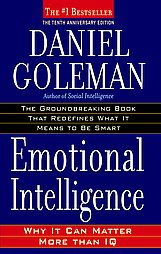 Emotional Intelligence by Daniel Goleman..explains Why it can matter more than IQ.
Emotional Intelligence by Daniel Goleman..explains Why it can matter more than IQ. Goleman's research studies the factors at work when those with high IQs flounder and those with only modest IQs excel. These factors respresent another way of being smart - one Goleman refers to as "emotional intelligence".
"At best, IQ contributes about 20% to the factors that determine life success, which leave 80% to other forces: forces grouped as Emotional Intelligence.."Goleman defines five critical skills that make up emotional intelligence..:
- Knowing one’s emotions — Self-awareness—recognizing a feeling as it happens—is the keystone of emotional intelligence. The ability to monitor what we are feeling moment-to-moment is crucial to psychological insight and self-understanding.
- Managing emotions — Handling feelings so they are appropriate.
- Motivating oneself — Marshalling emotions in service to a goal is essential for paying attention, for self-motivation, for mastery, and for creativity. Emotional self-control—delaying gratification and stifling impulsiveness—underlies accomplishment of every sort. And being able to get into the "flow" state enables outstanding performance of all kinds.
- Recognizing emotions in others — Empathy is the fundamental people skill.
- Handling relationships — The art of relationship is, in a large part, skill in managing emotions in others.
As emotional problems continue to increase, this information is becoming essential in helping us master our emotions, rather than being controlled by them. This book gives other qualities besides just intelligence recognition for their importance.
No comments:
Post a Comment